- Home
- Richelle Mead
Midnight Jewel Page 11
Midnight Jewel Read online
Page 11
“Half-Balanquan.”
“You don’t look . . . I mean. I haven’t actually met one of them. But I never would have guessed you weren’t . . .” I nearly said “one of us” and then felt stupid. I’d often complained about “us” and “them” hostilities between Osfridians and Sirminicans, yet here I was doing it with another group of people.
“What I am is more obvious to Balanquans than Osfridians.”
“Do they know? Here? Or in Cape Triumph?”
He shook his head. “Most don’t. It’s simpler that way.”
“So you get to blend in.”
“Is that what you want to do?”
I had to think about that question for a long time. “I’ll always think of myself as Sirminican—and I’m proud of that. But I’m trying to survive in an Osfridian world. I’m trying to earn its respect. I don’t know if that makes sense.”
“It makes perfect sense.” His gaze turned briefly inward. “When others so easily dismiss you, you want—no, need—to prove them wrong. To demand that respect.”
I tilted my head, putting myself more in his line of vision. “Are we still talking about me?”
He blinked and focused back on me. “You’re feeling very clever today, aren’t you?”
“Well, you’re not the only one who’s good at reading people.”
“Apparently not that good,” he said with a scoff. “Even I get fooled sometimes.”
There it was. Acknowledgment of my accomplishment. “You told me to practice. You didn’t say on whom.”
“Hey, I’m not chastising you. You did a good job.” He paused, his thoughts again straying away from me. Or to me? To last night? “You did what you needed to do. But why should I be surprised? If you don’t see any options, you make your own. At least, that’s what I’ve heard.”
His dark eyes were locked back on my face, eagerly waiting to catch every bit of my reaction. My smile faded. Why did those words sound familiar? Why did he seem so smug?
Good Brother, I appreciate your concern. And you’re right—desperate girls with no other options turn to desperate means. But I’m not one of those girls.
Not desperate?
Not without options. If I don’t see any, then I make my own.
I gasped. “That . . . was you! Almost a year ago! The monk on the church steps with Cedric.”
I’d never seen such a big smile on Grant’s face. “How do you think I got the idea to investigate your manor? Sir Ronald had me practicing disguises that day, and then fate delivered the perfect way to spy in Adoria. I’d heard of the Glittering Court before I left but hadn’t understood its full potential until then.”
“Unbelievable.” I shook my head. “I bet you’ve just been waiting for the perfect time to tell me this. I knew there was something weird going on then. Monks always keep their eyes down, but you were staring right at me.”
“Hard not to. I was just trying to eavesdrop on churchgoers, and then you two came out, a smooth-talking student and this fearless girl who . . .”
“Who what?” I prompted.
The smile disappeared. He shoved his hands in his pockets and put his back to me. “Who had better not use me for practice again. See you tomorrow, Mirabel.”
CHAPTER 9
ONWARD AND ONWARD WE WENT, EVERY DAY BRINGING us closer to Adoria. The days felt short now, and Grant was growing restless—nervous, even. He was quieter, often lost in his own thoughts. When he did talk to me, he’d usually end up repeating past lessons about Adoria. His sarcasm had lessened too.
“Everything’s important,” he told me one gloomy afternoon. Few people were out, though the captain expected us to sight land sometime this week. “Pay attention to who else these men talk to. Make note of any favorite pubs or businesses they mention. No one’s going to openly come out as a traitor, but they might tell you something useful without realizing it. You’ve just got to make sure you realize it.”
“I know. And I’m ready. I learned your codes. I memorized all the names, all the history. I can do this.”
He leaned against the ship’s rail and faced me, his elbow resting on the top of the wood. It was one of those rare days when the wind was still, letting his black hair rest around his face. I didn’t often get such a clear view of him. “I know you can. I just don’t want to miss anything.”
Such earnestness from him was rare, and I found myself in an equally unexpected role of reassurance. “You won’t. You’re going to do this. You’ll find these traitors and cut off their resources. You’ll be a hero.”
A glimmer of his dry humor surfaced. “You’ve got a lot of faith in me. How do you know I’m not actually a terrible spy? You’ve barely known me two months.”
“I’ve known you for almost a year,” I corrected. “Anyone who can pull off being a monk, a Flatlander, and . . . whatever you are now won’t have any trouble rooting out a handful of disgruntled men.”
“I hope you’re right. A handful of disgruntled men can do a lot of damage, especially men who are used to power and entitlement.”
“I know. Because they’re not the ones who actually have to deal with the consequences.” A coldness settled in the pit of my stomach as images of the past played through my mind. “The innocents do, people who don’t even want to be involved.”
“Adoria won’t become Sirminica, Mirabel.”
The gentleness of his tone startled me as much as shouting would have. “How did you know that’s what I was thinking?”
“Because I pay attention. Because I can tell you’re not just running to a new place—you’re running from an old one. You wear your ghosts.”
I shivered. “What’s that supposed to mean?”
“It’s what the Balanquans say when you keep the spirits of your loved ones close. That your pull is too strong to let them go on to the next world.” He gave me a pointed look. “And sometimes their pull is too strong. Like your father’s on you.”
I just stared at him.
Grant shrugged and said, “I told you, I pay attention.”
“My father was a hero. He saved countless lives.” I grew angry, seeing Grant’s blasé expression. “I don’t owe you my life history! And I don’t see you bursting with stories about your father either.”
“You want to know about him?”
“Like you’d really tell me.”
Grant shifted his stance against the rail, leaning over it and crossing his arms so that I only saw his profile now. He stayed silent for so long that I thought he’d relinquished the topic until he said, “He was Osfridian. My mother met him when she came to Cape Triumph with a trading group. They never married, and she never saw him again after she left. The Balanquans believe fathers should be in charge of teaching sons. If your father can’t, another male relative does. My uncle did for me, but he hated it. He hated me. And when I was ten, he finally claimed it wasn’t right to deny me my ‘real’ heritage. He sent me back to Cape Triumph to find my father, but he wasn’t there. Hadn’t been for years.”
“What did you do?” I was reluctant to speak, fearful he’d stop if he actually noticed he was opening up for once.
“This couple felt sorry for me and took me in—clothed me, fed me. They didn’t have any children of their own. They were good people, but they weren’t my parents, and I was angry about that. I got angrier and angrier as the years went by. I only wanted my father. Then, one day . . . he came back. And he was not a good person. Do you want to go inside?”
The abrupt question startled me, and I realized he’d noticed me trying to pull my cloak closer against the chill in the air. “I’m fine. Keep going. Why wasn’t he a good person?”
Grant hesitated, and I thought for sure I’d lost the moment. “Because he was an outlaw of sorts, not that I knew that at the time. I didn’t know anything about him, really, but when he offered to take m
e with him, I didn’t look back. I was fourteen. We went south—to the lands the Sirminicans abandoned when the war came. And I lived a life—and did things in that life—that are going to haunt me for the rest of this one. I thought I wanted it. I thought following my father’s path was the right thing. But after almost three years, I woke up one morning and realized I didn’t want that path. I needed to get out of that life before I turned into something that couldn’t be undone—what my father had already become. And so I left. I let him go.”
I shivered, though it had nothing to do with the cold. Grant’s past shared a lot of traits with mine, but I couldn’t bear to admit it.
“I told you mine. Are you going to tell me yours now?”
“Why do you care so much?”
He shifted his stance, rearranging the way he leaned on the rail. “Because . . . because I’d like to understand why you’re you.”
“My father was a hero,” I repeated. “Fighting to protect others is a noble thing.”
“I’m not denying any of that.” His tone was actually mild, but he had that look in his eyes, the one that could penetrate right into a person’s soul. “And I can see that drive in you. You’re ready to take on the world for the sake of justice. But I also see this look you get when your father comes up. Something about him bothers you.”
I suddenly felt stifled and trapped, despite the wide-open deck. “Your interrogation bothers me!”
“I’m trying to be nice.”
“Well, you aren’t very good at it.”
Anger kindled in his eyes. “I can’t believe you once accused me of being hard to like.”
“You don’t have to like me,” I reminded him. “We just have to work together.”
His response was to take off his long coat and toss it to me. “Put this on.”
“Why?”
“Because it’s freezing out here. And I do like you.” He sounded as though it annoyed him to admit it.
I clutched the coat to my chest, the heavy brown wool still warm from the heat of his body. The ire faded from me, and I looked down. “I just don’t want to talk about my father, that’s all.”
“Yes, I’ve gathered that. Now put the damned coat on. Or, no—forget it. Let’s just go inside. No one else is stupid enough to be out in this wind.”
Slowly, I lifted my head and gazed around. The sea roiled with angry waves, so dark they almost looked black. I’d been steadying myself and adjusting to the ship’s increased rocking without even realizing it.
“How did it get so windy so quickly?” I asked. “It was calm when we came out. I couldn’t believe how well your hair was staying in place.”
“You were studying my hair?”
“You tell me to study everything.”
But I didn’t feel nearly as flippant as I sounded. My skin crawled. The change in weather really had come on too suddenly. Lightning forked above us, and a huge wave hit the boat with such force that we—and some nearby sailors—had to scramble for footing. Grant caught me, keeping an arm around me until the deck steadied again.
Agostino ran up to us and said in Sirminican, “The captain wants all the passengers back in their cabins.”
“But it’s just another storm, right?” I asked. Rain began to fall. “You deal with these all the time.”
“Just get back to your room.” He scurried off to the other side of the ship.
“I don’t need to know Sirminican to understand that,” Grant said. “Let’s go.”
The rain came in sheets now, and the wind was so fierce that Grant had to fight to open the door that would let us climb below. It slammed shut as soon as he released it inside, but I could still hear the howling on the other side of the thick wood.
“I’m going to try to find out just how bad this is,” Grant said. “But I’d get ready for a long night if I were you.”
“Wait,” I called as he began heading for his corridor. “Grant, I . . .” He paused and glanced back. He didn’t look mad anymore. I couldn’t tell what he was. And I didn’t even know what I wanted to say. I simply handed him the coat.
“Be careful, Mirabel.” He vanished around a corner.
Back in my wing, I found my cabin empty and discovered that most of the girls had congregated in our common room. “Now, now, it’s just a little rough water,” Miss Bradley was telling them. The ship was heaving wildly now, and at least one girl gasped or screamed each time we rocked. “It’ll smooth out soon.”
“Where’s Adelaide?” I demanded.
Caroline glanced around. “Maybe she’s in your cabin.”
“No, I was just there.”
“Just wait. I’m sure she’ll be back soon,” said Miss Bradley.
But I slipped out of the door as soon as her back was turned, just in case Adelaide and I had unknowingly crossed paths. No luck. My room was still empty. I headed up to the deck again, making slow progress as the ship lurched. Even knowing what to expect outside, it was still a shock to fight my way out the door and immediately be slammed back by the gale. The storm had escalated far more than I’d expected, the rain now lashing my face. Wiping water out of my eyes, I stepped into the deluge on shaky legs and crept across the deck.
No one would have guessed it was only late afternoon. Dark, menacing clouds churned above, and it was hard to tell where they ended and the sea began. The rain obscured vision even more, and the only things I could clearly see were bolts of lightning that were almost instantly chased by thunder.
I squinted around, trying to find Adelaide. The lavender dress she’d worn this morning would have normally made her stand out. But everyone’s clothes were soaked and stuck to their body, making color difficult to discern. And everyone on deck was in motion. It was all crew as far as I could tell, and they frantically went about their work, hurrying to secure the ship as the captain and first mate struggled to be heard above the noise.
I moved among them, barely noticed by the panicked sailors, and kept searching for Adelaide. My shoes slipped on the wet wood, and the wind made movement even more difficult as I completed an unwieldy circuit of the deck. No sign of Adelaide. No sign of any passengers. Only I was foolish enough to face the elements, and it was time I got out of everyone’s way.
As I turned toward one of the doors leading below, I heard a cry off to my left. A sailor—practically a boy, younger than me—had just lost his grip on a rope that connected to one of the sails. The wind snatched the rope away, causing it to flutter wildly as the sail above us unfurled. He strained to reach the dancing line but wasn’t quite tall enough. I hurried to his side and tried my luck. I was the right height, but the rope’s wild movement made it hard to catch. It slipped through my fingers several times before I was finally able to grasp its end.
The mast above us was one of the smaller ones, but I could see it bending as the wind filled its sails. Other sails were being reefed, and if this one wasn’t brought in soon, the mast would snap from the force of the storm. I handed the rope to the boy, who began pulling at it to no avail. I heard a crack from above, but the mast stayed put. Grabbing hold of the rope, I tried to add my weight, but the wet fibers kept slipping through my fingers.
“Out of the way,” a voice barked. A large, burly sailor had stridden up to us and snatched the rope away. It slipped in his hands too, but his grip was surer, his muscles stronger. As he drew the sail in, the strain on the mast eased up. When he’d reeled in enough, he tied the rope up securely and hurried off to his next task without a word to us.
The young sailor gave me a quick nod of thanks and started to follow the other man when we both heard the cracking sound again. A yard broke free of the mast and began to fall. I pushed my young companion out of the way but wasn’t quite fast enough. I slipped and fell backward on the deck, near its edge. The beam came down on my foot, and it was only through the most incredible luck that the part that la
nded on me was slightly hollowed out—big enough to save my foot and ankle from being crushed by the beam’s full force, but not big enough to let my leg slide out. I was trapped.
The sailor jumped down beside me and tried to push the beam off but didn’t even budge it. “I’ll get help,” he shouted. He disappeared into the haze of rain, and judging from the frantic way everyone was hustling about, I doubted help would be coming anytime soon. No sailor would halt work that could save this ship in order to rescue one unwary passenger.
I tried tugging my leg again, but the yard held fast. It was so heavy that it didn’t roll around as many other loose items did on the rocking ship, so that was something. Pinned in place, I was able to focus more on what was happening. Most of the sails had been secured. Waves broke over the ship’s deck when we tipped too far, making me feel certain we’d go all the way over. We righted each time, but part of me kept thinking it was just a matter of time before our luck ended.
Through the wind, I heard a crotchety voice yell at someone, “What are you doing, girl? Get below!”
And a familiar voice answered: “Get help! You have to get it off her!”
Astonished, I looked up as Adelaide came toward me, fear on her pale face. An old sailor was hurrying past her. “You get it off her. We’ve got to keep this ship from sinking.”
Adelaide knelt beside me and attempted to pull the beam away. A new panic set in, not for me, but for my friend. The wind and waves were too powerful, and we were dangerously close to the edge.
“It’s too heavy! Leave me, and get back below.”
Adelaide’s face hardened as she tried again. “Never.”
I could see the effort it cost her, the pain she endured. As I tried to urge her away again, Grant suddenly crouched down beside her. His flyaway hair was now slicked down against his head. “Pull with me,” he ordered Adelaide. When their efforts proved fruitless, he shot her a glare. “Damn it. Are you even trying, girl?”
If Adelaide was shocked at the difference between real-Grant and public-Grant, she didn’t show it. She was too worked up over me, too scared and frustrated. “Of course I am!”

 Vampire Academy
Vampire Academy Succubus Blues
Succubus Blues Storm Born
Storm Born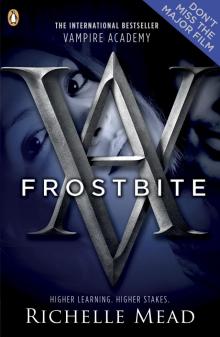 Frostbite
Frostbite The Fiery Heart
The Fiery Heart Soundless
Soundless The Immortal Crown
The Immortal Crown Dark Swan Comic 1-4
Dark Swan Comic 1-4 Shadow Kiss
Shadow Kiss Vampire Academy: The Untold Stories
Vampire Academy: The Untold Stories Shadow Heir
Shadow Heir The Golden Lily
The Golden Lily Thorn Queen
Thorn Queen Bloodlines
Bloodlines The Indigo Spell
The Indigo Spell Blood Promise
Blood Promise Silver Shadows
Silver Shadows Last Sacrifice
Last Sacrifice Spirit Bound
Spirit Bound Succubus Shadows
Succubus Shadows The Ruby Circle
The Ruby Circle Iron Crowned
Iron Crowned Midnight Jewel
Midnight Jewel Succubus Revealed
Succubus Revealed Vampire Academy: The Ultimate Guide
Vampire Academy: The Ultimate Guide Succubus Heat
Succubus Heat Succubus on Top
Succubus on Top The Emerald Sea
The Emerald Sea City of Demons
City of Demons The Glittering Court
The Glittering Court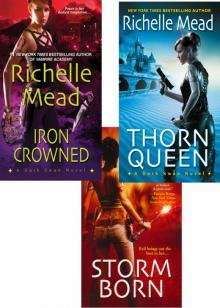 Dark Swan Bundle
Dark Swan Bundle Shadow Heir ds-4
Shadow Heir ds-4 Vampire Academy: The Complete Collection: 1/6
Vampire Academy: The Complete Collection: 1/6 Vampire academy va-1
Vampire academy va-1 Something Borrowed
Something Borrowed Richelle Mead Dark Swan Bundle: Storm Born, Thorn Queen, Iron Crowned & Shadow Heir
Richelle Mead Dark Swan Bundle: Storm Born, Thorn Queen, Iron Crowned & Shadow Heir Last Sacrifice (6)
Last Sacrifice (6)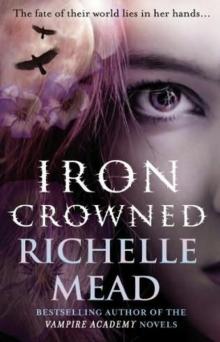 Iron Crowned ds-3
Iron Crowned ds-3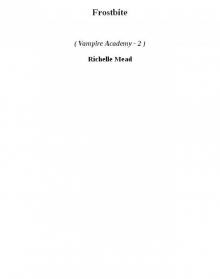 Frostbite va-2
Frostbite va-2 Spirit Bound va-5
Spirit Bound va-5 THORN QUEEN ds-2
THORN QUEEN ds-2 Shadow Heir: A Dark Swan Novel#4
Shadow Heir: A Dark Swan Novel#4 The Indigo Spell b-3
The Indigo Spell b-3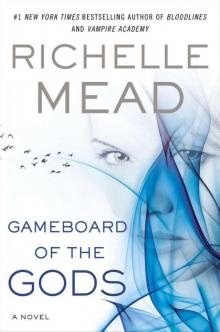 Age of X01 - Gameboard of the Gods
Age of X01 - Gameboard of the Gods Succubus Heat gk-4
Succubus Heat gk-4 Storm Born ds-1
Storm Born ds-1 Succubus Revealed gk-6
Succubus Revealed gk-6 Bloodlines b-1
Bloodlines b-1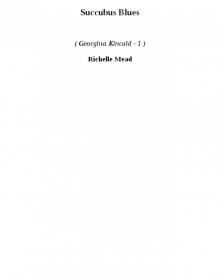 Succubus Blues gk-1
Succubus Blues gk-1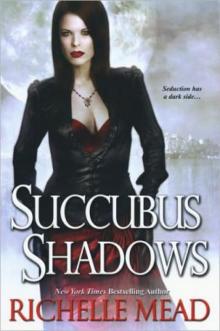 Succubus Shadows gk-5
Succubus Shadows gk-5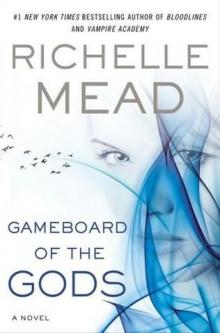 Gameboard of the Gods aox-1
Gameboard of the Gods aox-1 Last Sacrifice va-6
Last Sacrifice va-6 The Golden Lily: A Bloodlines Novel
The Golden Lily: A Bloodlines Novel Blood Promise va-4
Blood Promise va-4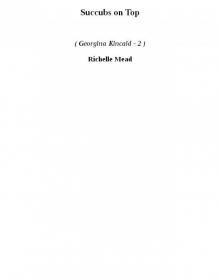 Succubs on Top gk-2
Succubs on Top gk-2 The Fiery Heart b-4
The Fiery Heart b-4 Shadow Kiss va-3
Shadow Kiss va-3